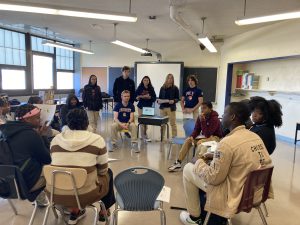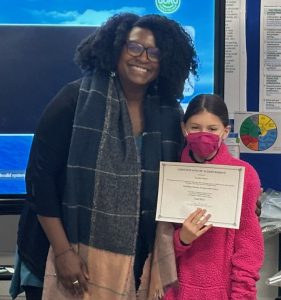By Michele Hong
After over 18 years of supporting chronically absent students and families in Baltimore City and across Maryland, the Truancy Court Program (TCP) has changed its name! Beginning in the 2023-2024 school year, what was once known as the TCP is now the Tackling Chronic Absenteeism Project (TCAP). Despite the new moniker, the program remains the same – a non-punitive, holistic, and restorative approach to addressing chronic absenteeism in Baltimore City Public Schools (City Schools). During the Fall 2023 Session, TCAP operated in six City Schools, including one elementary school, three elementary/middle schools, and two high schools.

Global Gardens Students at Collington Square Elementary/Middle School
The Fall 2023 session kicked off with Orientations at each of the six schools in mid-September. During the Fall 2023 session, the TCAP Team served 78 students and families. The TCAP Team consists of a Coordinator, Mentor, Case Manager, and Attorney. Each weekly session includes check-ins with a volunteer judge, restorative circles, and academic tutoring from staff or UBalt students. Throughout the week, members of the TCAP Team work diligently to address any individual or systemic issues that are uncovered in the weekly check-ins, phone calls, texts, and restorative circles. While the issues impacting truancy are myriad, barriers that frequently resonate with our families include housing insecurity, transportation, food insecurity, violence, trauma, and parental incarceration. Throughout the Fall session, the TCAP Team completed 12-14 weekly sessions at each of the six schools, culminating in graduations held at each school beginning in mid-December.
Students who successfully fulfill all program obligations and requirements graduate from the program. TCAP changed its graduation metrics to better align the program with City Schools’ chronic absenteeism efforts. Historically, students graduated from the TCP, if they demonstrated a 65% decrease in absences and/or tardies. Schools are now focusing on “attendance rates.” As a result, students graduate from the TCAP when at least one of the following conditions is met:
1) The student improves their attendance rate by at least 10%, when comparing attendance during the TCAP against attendance in the prior two quarters;
2) For those students where attendance data from the prior two quarters is not available, the student has an attendance rate of at least 85% while participating in the TCAP; or
3) At the discretion of the TCAP Judge in consultation with the TCAP Team. Discretionary authority provides an opportunity to “graduate” those students whose pre-TCAP attendance rate was 91% or higher and thus could not mathematically improve by 10%, but who demonstrate improved attendance, academic achievement, and attitude towards school attendance.

CFCC Executive Director Aubrey Edwards-Luce pictured with Kaylie Ebert, a TCAP Graduate of Maree G. Farring Elementary/Middle School
Applying the metrics stated above, 62 of the 78 students (79%) successfully graduated from TCAP. Historically, the TCP typically attained a 70-75% graduation rate. Graduation rates were lower, however, during Covid’s period of virtual learning, as well as directly after the return to “in-person” learning. We are excited to see an improvement in our graduation rates!
In addition to our regular weekly programming, the TCAP Team invited members from the community to facilitate workshops for our students. During the Fall Session, the following workshops were provided to students:
- CFCC Executive Director and a volunteer TCAP judge, Aubrey Edwards-Luce, facilitated workshops on “Understanding How Trauma Affects the Body and Coping Mechanisms” for students of all ages.
- Three law students from the University of Baltimore School of Law, Bronfein Family Law Clinic, presented an interactive workshop on “Know Your Rights: Voting and the Police” with high school students.
- The TCAP Case Manager hosted a workshop on the high school choice process and how to select schools for middle school students.
- Mark Friedenthal, a public defender and TCAP volunteer judge, spoke to high school students about their rights when stopped by the police both on school grounds and in public.
- Students from the Baltimore Polytechnic Institute (Poly) partnered with Great Kids Farms and My Box to facilitate a workshop on climate change and gardening, “Global Gardens: Climate Change and You” for middle school students. Poly students also spoke to the middle school students about school choice and their own experiences at Poly.
CFCC is most grateful for the support we receive from state and federal funders, foundations, and individuals, among others. This support has allowed us to operate the TCAP in City Schools for the last 19 years. Through the years, we have collaborated with countless organizations and programs to operate our program, including the Office of the Public Defender, the Pro Bono Resource Center, Disability Rights Maryland, Great Kids Farms, My Box, and the Family League of Baltimore City, to name a few. Through collaborative efforts, we are better able to support our students and families.
Many of our TCAP families are food insecure and rely on the free breakfast and lunch that is provided at every City School. For the last two years, we have been providing Spring Break Food Baskets to these families, as a resource when the free meals are not available. We recently hosted a bake sale to raise funds to support our Spring Break Food Basket project, as well as any other items a family may require (e.g., alarm clocks, school uniforms, warm clothing). If you would like to donate to our TCAP Fund, kindly click on the link below.